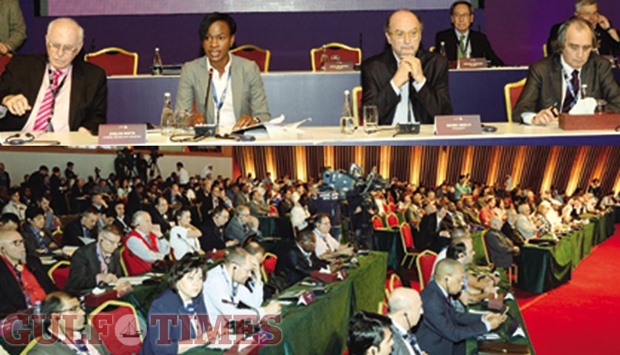The wives should find something to do while the men discuss their business. Sounds like a scene from an old western classic, but we don’t have to look far back to find this exact same thing happening, in the 21st century. However, that could all be changing in Doha – a decade after there were almost no women noticeable at AIPS (International Sports Press Association) congresses.
Evelyn Watta, interim secretary general of the AIPS Executive Committee, attended her first congress here in Doha ten years ago and she can clearly see how things have evolved. An example of that is a proposal from the Nordic Association, who have recommended changing the name of what is known as the “Women’s Program” at the AIPS Congress to a more appropriate name, for example the “Partners’ Program”.
This programme is, in general, planned activities for the spouses of the people attending the congress. Watta remembers when her husband was the only man attending, but times have changed. And so should the name. “It should be called a Partners’ programme, and that is an example of us moving forward,” she said. From the old Wild-West to modern blockbusters.
But even so, it’s noticeable that of the 19 members attending the Executive Committee meeting at the AIPS Congress this year, only three are women. So you can only wonder how the situation was before. In essence, in order for women’s voices to be heard even louder there are more stereotypes that need to be broken down.
“Back then it was like a gentleman’s club. But the president introduced a discussion on women in sports, where he thought it was important for us to share our experiences. And we did. Looking back, ten years later, I think a lot has changed. And after this congress I hope we can start to move the conversation forward, stop talking about women as sports journalists but rather about our capabilities,” said Watta – and she’s optimistic about the congress this year.
“There is nothing holding us back. Right now we have a lot more women attending the congresses, but ten years ago they were only three or four. We are no longer in single digits, and that is something we can be proud of. But we need to keep moving forward and get better. We have now founded a Womens’ Commission which did not exist ten years ago. So there is a platform for them to come and join us.”
But what exactly has changed in the last ten years or so? One of the most important steps was taken in 2005, when Laima Janusonyte-Steinhoff was the first woman in the history of AIPS who got elected as vice president.
“It was a challenge, because before there were only men. But I tried and I got to this point,” Janusonyte-Steinhoff said, admitting that women have always needed to work even harder to reach their accomplishments. Especially in this field.
“Sports journalism is a man’s world and it always has been. The stereotype of sports journalists is that they have to be men. As you look around, there are very few women. In leading position are about 1% of women if I’m not mistaken, and you have to work hard because you don’t get anything for free,” she said.
She added that it can be hard to encourage women to become sports journalists in the world today, especially when the ‘man’s world’ stereotypes are very much alive in the sporting world.
“We created these stereotypes ourselves, but why? Women in sports are covered around 30% in the media, and many say that’s because they’re no good. But it’s these kind of stereotypes that keeps this alive. We need to break this.”
But what is there to do? Many have talked about quotas, for example to give certain amount of seats in the Executive Committee to women. What does the vice president think about that?
“Quotas can be dangerous, if women automatically get their place in top positions. Rather we need to start with the national associations, to encourage more women to join,” says Janusonyte-Steinhoff.
Watta has a similar opinion about quotas. She was also the first African woman to take seat on the Executive Committee. She is also familiar with quotas from her home country, Kenya, and the Sports Journalists Association of Kenya is proposing that each AIPS Commission must include a woman.
“I have always been against quotas, although limited quotas are okay. But at AIPS we just need to increase our female membership delegates. In my country, we always had quotas for women and we ended up filling positions with women for the sake of it. It affects the quality,” she said. (AIPSMedia.com)

Evelyn Watta (second from left), interim secretary general of the AIPS Executive Committee, and AIPS Executive Committee president Gianni Merlo (second from right) at the 79th AIPS Congress in Doha. PICTURES: Thajudheen
